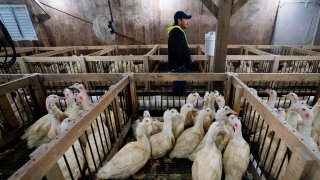
An employee checks on the ducks at Hudson Valley Duck Farm December 15, 2017 in Ferndale, New York.
Business people, restauranteurs, the simply curious and even politicians visit the Hudson Valley Foie Gras farm in Ferndale, a two-hour drive into the Catskill Mountains from Manhattan, in their hundreds each year. For more than three decades, Izzy Yanay has fought to win acceptance for US foie gras, using his Catskills farm to charm skeptical chefs and counter animal rights campaigners trying to ban the controversial delicacy.
New York City’s planned ban on the sale of foie gras is being challenged in court by two upstate farms that claim it would leave them financially devastated.
The two major foie gras producers, Hudson Valley Foie Gras and La Belle Farm, said the law enacting the ban set to go into effect Nov. 25 should be declared “invalid and void" in a lawsuit filed Friday in state court in Manhattan.
Proponents say the production of foie gras — the fattened liver of a duck or goose — is cruel to the animals because it involves force feeding.
Get Tri-state area news and weather forecasts to your inbox. Sign up for NBC New York newsletters.
While the ban has been cheered by animal welfare advocates, the farms said the loss of the vital city market would jeopardize their operations. La Belle anticipates having to let go most of its 100 employees and may be forced out of business. Hudson Valley would have to terminate dozens of employees, according to the complaint.
The farms argue the city law should be invalidated in part because it imposes a ban on the sale of products that can be produced and sold in compliance with state and federal law. The lawsuit also argues that the city exceeded its authority by “attempting to eliminate” farming operations about 80 miles (130 kilometers) away.
“The City’s attempt to legislate a farming practice occurring outside its borders is unprecedented and alarming,” according to the complaint.
A spokesperson for the city corporation counsel said the lawsuit is under review.